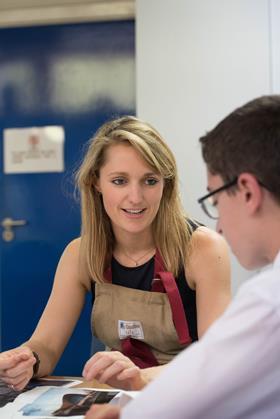Louisa Mulvaney shares how she discovered her calling as an art teacher and why she is committed to getting the best out of her students
I did an English degree at Birmingham University, and in my second year changed to English and History of Art. On graduation I volunteered for a charity, and then worked at the Dulwich Picture Gallery in 2008 as a community outreach worker with the elderly. It was after the economic crash and they ran out of funding, so I couldn’t get a permanent contract. I then worked as a youth worker for two years, and at a summer camp I ran an art workshop. The combination of art and teaching made me happy, and I realised I was good at it. I had been experiencing anxiety, and found teaching really absorbing.
I was working on a council estate in London at the time, and Thames Christian School was on the same estate. I got in contact with the head and was given an interview. When I was waiting at reception, I felt God say: “You are going to come and teach here.” I was also offered an interview at another school, which I didn’t get, but Thames offered me a role as a TA (teacher’s assistant) and said after a year they would pay for me to train. I accepted, with confidence in the decision because of what I believe God had said. Amazingly, I could train as an art teacher because I had studied art history, so I am very glad I was prompted to change my degree! I trained on the job for two years through the Institute of Education. I work as an art teacher and also as the head of safeguarding.
It’s so important that Christians are working at the top of education
To be a good teacher is an impressive feat and I hugely admired the people I met who did it well. They became my role models and inspirations. I saw the teachers who had high aspirations for their pupils, and were committed to getting the best out of them. I was so determined to get better at teaching. I couldn’t see what could be more significant than developing young people. A good teacher sees the role as a vocation, not just a job. As a teacher you are a community figure to the children, and that is why talking about your personal life to gain connection is not always helpful. You need to be a figure of strength, and that is both in the classroom and in the corridors. The headteacher says he knows how well his teachers are doing by how they interact with pupils in the corridor. Attention to detail and every aspect of a child’s behaviour has to be watched; you need to be vigilant. As a teacher you need to develop the child and the school culture. The Year 7s will come in and look at Year 11s for how they should behave.
I became a Christian gradually. I had a Christian family and my dad was a vicar in Bath. When I was 15, I made my own personal decision to follow Jesus when a team of YWAM (Youth With a Mission) volunteers stayed with my family. I saw them listening to God, praying together in my home. The possibility of hearing from God and having a relationship with him for myself drew me in.

The Bible verse that connects me to my work is Colossians 3:23-24: “Whatever you do, work at it with all your heart, as working for the Lord, not for human masters, since you know that you will receive an inheritance from the Lord as a reward. It is the Lord Christ you are serving.” In teaching there is sometimes a temptation to cut corners or not do my best when more experienced. This verse helps me to give my all each day.
I work with children from the ages of eleven to 16 (years 7-11) and each age group has different challenges. I feel, whatever age, it is my job to make them believe that school is important to them and can change their lives, particularly when outside forces compete for their attention or they don’t want to work hard. The pride they discover when they work harder than ever before and achieve something they didn’t think they could is always very special to see.
Social media and smartphones have impacted teaching, mainly because they have made the voices trying to get teenagers’ attention louder and seem more present and pressing. Young people want to grow up ‘right now’. Through social media they can have an influence at a young age but often aren’t ready for the responsibility. Social media can’t offer the nurturing protection that children need while they learn the necessary skills.
When I was training to be a teacher I found it so busy and challenging I used to be thankful just to get to the end of the school day. Sometimes when a day was very difficult and busy I would realise a group I was teaching were on a school trip and I’d get a free period so I could do more planning. God has so often provided what I need to get through each day. In more ongoing ways, he has answered my specific prayers. For example, a child I was supporting through safeguarding and teaching art to, developed more of a sense of self and skills as an artist and it helped her begin to handle her life challenges.
I love being part of a Christian school like Thames, and find it very fulfilling to work in such an environment. I don’t think everyone has to send their child to a Christian school if they are a Christian, but it’s so important that Christians are working at the top of education. We need Christians who can contribute ideas and be part of the ongoing debate about how best to support and educate young people.
The Thames ethos uses Christian principles to develop values to lead school life. At the core of the school is a belief that God has made each child and the school nurtures that child so that they can do what they have been made to do. The school believes in prayer so at the start of each day there is a prayer for God to help us teachers do our jobs and help the pupils learn.
whatever age, it is my job to make them believe that school is important to them and can change their lives
There are many issues in education at the moment. A lot of them are issues in society at large being worked out within the microcosm of a school. There is a huge need to support children with special educational needs; knowing how best to do this as well as having the funding to do so. One task of a teacher is to help children develop a positive belief about who they are. Schools also need to navigate how to discuss relationships and sex education.
To get involved in the education of your children, first, talk to your child / teenager about their day and also don’t jump to conclusions if they say something is going on. Try to listen to all sides – which includes speaking to their teachers. Someone said to me: “You think looking after young children is hard, teenagers want to open up at 11:30pm just as you are going to bed.” So being available is important.
Do you think younger generations have a better standard of education than in past years? womanalive@premier.org.uk





























No comments yet